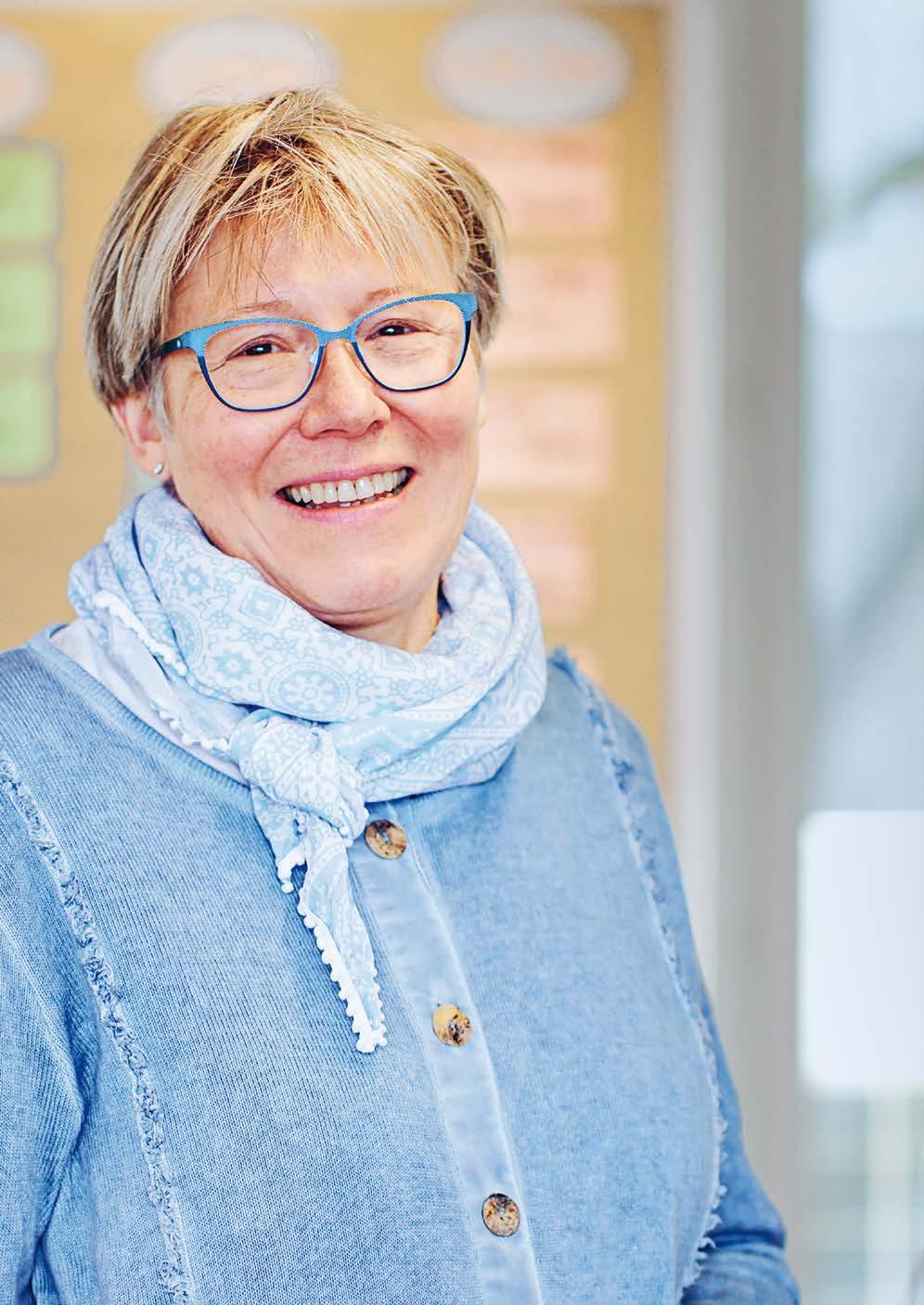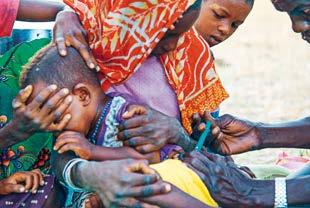
10 minute read
In Retrospect
JANUARY
Research & Development for Parasitic Worm Infections Lags Behind Neglected tropical diseases (NTDs) are a group of mainly chronic infectious diseases that affect more than a billion people in tropical and subtropical countries. On the occasion of World NTD Day on 30 January, Jennifer Keiser, Head of the Helminth Drug Development unit at Swiss TPH, addressed past achievements and current challenges in the fight against NTDs.
FEBRUARY
→ An improved understanding of what influences immune system development is key to informing vaccine design for children. → Jennifer Keiser (right) conducting research on NTDs in Lao PDR.
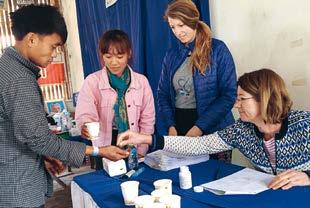
New Understanding of Childhood Immune Systems May Improve Vaccine Efficacy In low and middleincome countries, children have the greatest need for protection afforded by vaccination due to a higher incidence of infectious diseases. However, the vaccines for these children often show a lower efficacy when compared to similar populations in highincome settings. A study by Swiss TPH and partners in Science Translational Medicine revealed that the immune system of children varied according to age, location and anaemia status. This knowledge is crucial to improve vaccine efficacy.
MARCH
Robust Modelling Methodology Leads to Better Understanding of Air Pollution and Health in Europe According to the World Health Organization, air pollution is responsible for about one in every nine deaths annually. A study by Swiss TPH published in Environment International used robust modelling methodology to estimate nitrogen dioxide levels in Europe through the combination of monitors, satellites and chemical transport models. The study provides relevant information on air pollution to assist policy makers and scientists in the decisionmaking process.

→ Air pollution in a European city.
2.5 Million Euro Grant Awarded to Swiss TPH for Tuberculosis Research Sébastien Gagneux, Head of the Department of Medical Parasitology and Infection Biology at Swiss TPH, was awarded a European Research Council Advanced Grant for EUR 2.5 million over five years to conduct research on tuberculosis. The highly competitive grant supports scientists who are conducting cuttingedge research in their field. Gagneux’s research focuses on multidrugresistant Mycobacterium tuberculosis.

→ Tuberculosis research at Swiss TPH.
APRIL
Kaspar Wyss New Deputy Director of Swiss TPH Kaspar Wyss, Head of the Swiss Centre for International Health, was appointed the Deputy Director of Swiss TPH. He succeeds Nino Künzli, who stepped down after 10 years in the position.
→ Kaspar Wyss, left; Nino Künzli, right.
MAY
Swiss TPH Awarded Three New Grants from the Botnar Research Centre for Child Health to Combat COVID-19 Swiss TPH was awarded 3 out of 11 new research grants from the Fast Track Call for Acute Global Health Challenges from the Botnar Research Centre for Child Health (BRCCH). The research projects will help mitigate COVID19related medical and public health challenges.
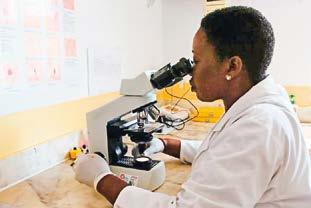
→ A scientist conducts research on malaria in Bagamoyo, Tanzania. → Swiss TPH was awarded three new research projects to combat COVID-19.
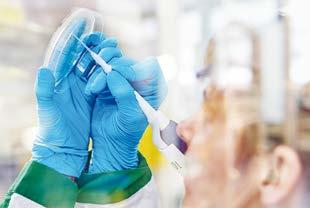
Molecular Signatures Can Predict the Efficacy of Malaria Vaccines A new study reveals that it is possible to identify individuals that will be protected by the malaria vaccine before its administration. The researchers also found that boosting the immune system before vaccination could potentially improve vaccine efficacy. The study from ISGlobal and Swiss TPH was published in Science Translational Medicine.
JUNE

→ Topping out ceremony in Allschwil, Switzerland. Topping out Ceremony of “Belo Horizonte” The construction of the new Swiss TPH headquarters “Belo Horizonte” in Allschwil progressed well throughout 2020. The traditional topping out ceremony for the construction workers took place on 19 June. The move of Swiss TPH to Allschwil is planned for the end of 2021.
JULY
Antibody Prevalence and Impact of the Coronavirus in Basel A longterm study on the effects of the COVID19 pandemic was carried out in Basel. The study contained both a digital survey that looked at the effects of COVID19 on individual’s quality of life and conducted antibody testing. BaselStadt and BaselLandschaft contributed equally to the costs of the longterm study, which was carried out by Swiss TPH.
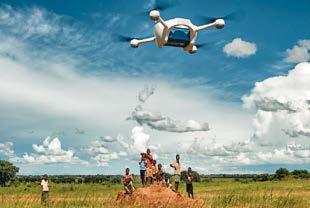
→ Drones for healthcare delivery in Madagascar. → The COVCO study in Basel.
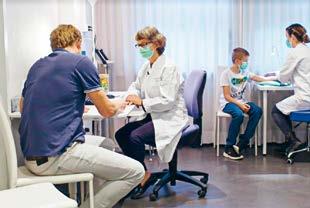
Drones to Deliver Tuberculosis Drugs in Madagascar As drone technology continues to expand beyond the military and recreational sectors, it is foreseen that it will have a significant role to play in healthcare delivery. A project supported by Swiss TPH tested the usefulness of drones in transporting tuberculosis drugs and diagnostic samples in Madagascar, and found that in combination with other innovative interventions, they can be both costeffective and contribute towards the goal of universal health coverage.
AUGUST
Julia Bohlius Appointed New Head of Education and Training Julia Bohlius was appointed the new Head of the Department of Education and Training (ET) at Swiss TPH, succeeding Nino Künzli. Künzli remains head of the BachelorMasterDoctorate unit within ET and will pursue his research projects on air pollution and health as project leader in the Department of Epidemiology and Public Health (EPH). He will also keep his role as Professor of Public Health, Social and Preventive Medicine at the University of Basel until June 2022.
SEPTEMBER
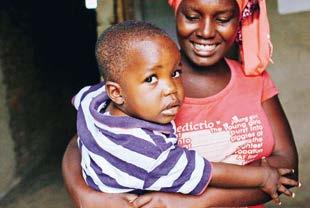
→ A woman and her child in Ifakara, Tanzania await malaria care.
OCTOBER
HIV Self-Tests: Key Contributor to Ending HIV Epidemic in Sub-Saharan Africa In Africa, a part of the world that shoulders most of the HIV burden, homebased HIV testing is a promising solution to address the HIV epidemic. In two studies published in The Lancet HIV and the Journal of International AIDS Society, Swiss TPH and partners found that HIV selftests during homebased testing campaigns significantly increased people’s awareness of their HIV status, particularly in the most remote regions. Only One Third of Children Receive Appropriate Malaria Care Despite much progress made in the past decade, more than 270,000 children die from malaria each year. Most of these deaths could be avoided through timely diagnosis and treatment. Despite better availability of tests and medication, a study from Swiss TPH and partners in PLoS Medicine showed that large gaps remain in the quality of malaria care for children.

→ On the move to home-based HIV self-tests in Lesotho.

→ The leprosy control programmes are in Brazil, India, Indonesia, Myanmar, Nepal and Sri Lanka.
Obituary: Prof. Dr. Niklaus A. Weiss and Camilla Weiss It was with great sadness that we said goodbye to our former Vice Director, researcher, esteemed teacher and mentor Niklaus A. Weiss and his wife Camilla Weiss. We lost two committed individuals and revered colleagues. Contact Tracing With Prophylactic Treatment Could Near-Eliminate Leprosy Postexposure prophylaxis with a single dose of the antibiotic rifampicin is safe, can be integrated into different leprosy control programmes, and is generally well accepted by patients and healthcare workers. These were the results of the Leprosy PostExposure Prophylaxis (LPEP) programme published in The Lancet Global Health. Swiss TPH contributed to LPEP through monitoring and quality control, protocol development and data analysis.

→ Niklaus A. Weiss and his wife Camilla Weiss.
NOVEMBER
Closing Symposium of the TIGER Project TIGER was an EUfunded project between France, Germany and Switzerland to support the crossborder monitoring and control of the Asian tiger mosquito in the Upper Rhine region. Swiss TPH hosted a oneday virtual symposium where the project team, consisting of Swiss TPH and partners, presented on the current situation of the spread of the tiger mosquito in the region, as well as the project results from the past three years.
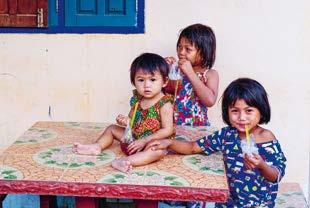
→ Children in Lao PDR. → An Asian tiger mosquito.
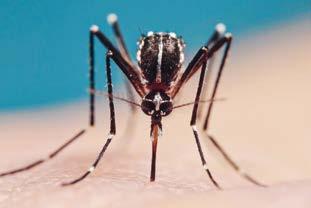
Pascale Vonaesch Received SNSF Eccellenza Professorial Fellowship Pascale Vonaesch, Scientific Project Leader at Swiss TPH was awarded a prestigious Eccellenza Professorial Fellowship grant of the Swiss National Science Foundation (SNSF). The grant will allow Vonaesch to pursue her research in childhood nutrition and health.
Largest Clinical Trial in Africa to Treat COVID-19 Cases Launched in 13 Countries African countries and an international network of research institutions, including Swiss TPH, joined forces to launch the largest COVID19 clinical trial in mildtomoderate outpatients in Africa. ANTICOV aims to respond to the urgent need to identify treatments that can be used to treat COVID19 early and prevent spikes in hospitalisation that could overwhelm fragile health systems in Africa.
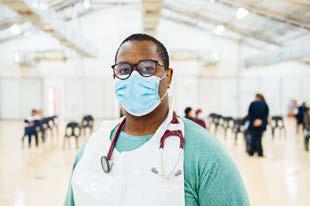
→ A doctor in the fight against COVID-19.
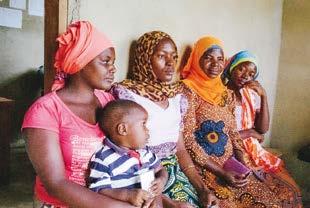
→ Women in Ifakara, Tanzania. Iron Infusion Proves Effective to Treat Anemia in Rural Africa Irondeficiency anemia is a major concern in lowincome settings, especially for women. In a study by Swiss TPH and partners published in The Lancet Global Health, researchers found that iron infusion was feasible, safe and in contrast to the standard irondeficiency anemia treatment of oral iron tablets, highly effective in Tanzania. This is the first study to provide evidence of the benefits and safety of iron infusion in a lowincome setting.
Airplane Noise at Night Can Trigger Cardiovascular Death A study demonstrated that loud nighttime noise from airplanes can trigger a cardiovascular death within two hours. Researchers from Swiss TPH and partners compared mortality data with acute nighttime noise exposure around the Zurich airport between 2000 and 2015. The results of the study were published in the European Heart Journal. R. Geigy Award 2020 went to Tobias Schindler Tobias Schindler received the R. Geigy Award 2020 worth CHF 20,000 in recognition of his achievements in the development of new diagnostic tools in the fight against diseases such as malaria and COVID19 in Africa. The R. Geigy Foundation presents this award every two years to young researchers who have distinguished themselves through outstanding achievements in the field of neglected tropical diseases or public health.
DECEMBER
Swiss TPH Symposium: Reshaping Healthcare Supply Chains Strong and resilient supply chains ensure the provision of quality health products and vaccines to patients, making them a central component of health systems. At the virtual Swiss TPH Winter Symposium, experts from academia, public administration, international organisations and the private sector came together to discuss how we can achieve universal access to high quality, affordable medicines and vaccines.

→ The current Swiss TPH headquarters in Basel, Switzerland. → Kids following a drone in Madagascar.
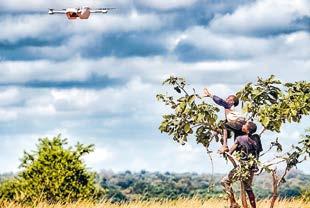
Swiss Government Increases Funding for Swiss TPH The Swiss Federal Department of Economic Affairs, Education and Research increased its core contribution to Swiss TPH from CHF 25 million to CHF 32 million over the next four years. Together with the additional funding from the two Basel cantons, which increased from a joint amount of CHF 7.26 million per year to CHF 8 million, the contribution over the next four years (2021–2024) will support the work of Swiss TPH in improving public and global health.
“Working at Swiss TPH the past 26 years has been an amazing experience. It is a unique place to work in that it brings together people and cultures from around the globe who share knowledge, experiences and practice. One of my highlights has been leading the Health Care Management course that contributed to capacity building for the next generation of leaders in global health.”
Bernadette Peterhans, Head of Professional Postgraduate Training unit at Swiss TPH
